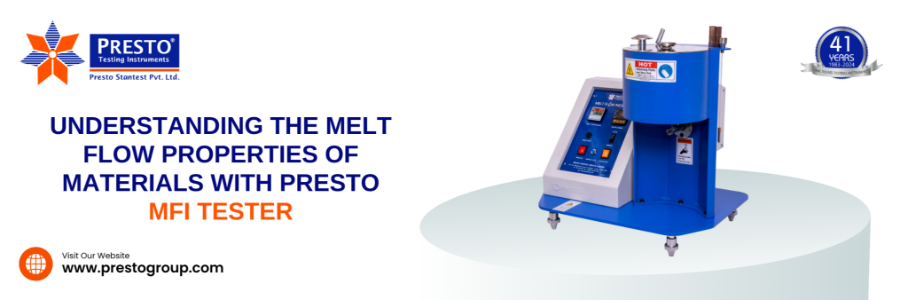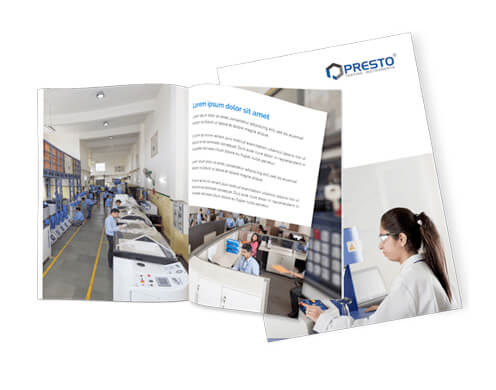Understanding the Melt Flow Properties of Materials with Presto MFI Tester

The melt flow index (MFI) serves as a vital parameter in the assessment and quality assurance of polymers. It gauges the polymer's ease of melting and flowing under specific conditions. Specialized instruments are employed for testing, accurately measuring both the weight and volume of molten polymer passing through a standardized capillary orifice within a specified time frame. Accurate melt flow index values empower manufacturers to assess crucial properties, including viscosity, molecular weight distribution, processability, and the potential applications of diverse polymers.
Presto is a leading melt flow index tester manufacturer and designs this quality testing equipment at the best and most affordable prices. The examination is carried out under defined conditions of temperature, load, and piston position within a cylindrical cavity housed in a heated metallic tube barrel. The MFI machine strictly conforms to standard temperature and pressure terms as outlined in ASTM D 1238-1992, ISO 1133, IS 2267-1972, IS 2530-1963, and IS 10810-1984.
Working Principle of Presto MFI Tester
The underlying principle of MFI testing is relatively straightforward: a known quantity of melted plastic is compelled through a die under standard conditions, and the resulting weight or volume is measured within a specific timeframe. The test result is typically expressed as grams per 10 minutes (g/10 min).
Conducting a melt flow test on PVC granules is a straightforward process that provides valuable information for optimizing processing conditions in manufacturing processes such as extrusion or injection moulding.
The data obtained from this test is instrumental in formulating ideal processing conditions, contributing to product consistency and reliability. This, in turn, empowers researchers to make well-informed decisions regarding material selection for various industrial applications.
For calculating the melt flow index of polymers in the plastic and polymer industry, the following formula can be effectively utilized:
Flow rate=600/t ×Weight of extrudate of polymers
Where:t represents the time of extrudate in seconds
Now, let us discuss some factors that may affect the quality of products.
Quality Factors that may Affect the Quality of Products
In terms of plastic product testing, the melt flow index is essential as it provides valuable insights into the flow properties of the polymers. Nevertheless, multiple factors can impact MFI results. It is crucial to understand these factors and acquire the knowledge to make necessary adjustments, ensuring that the obtained data is accurate and reliable.
1. Temperature Influence:
Elevating temperatures cause a reduction in the melt viscosity of polymers, leading to an increase in MFI values. Recognizing this correlation is vital when interpreting MFI data. Inconsistencies in testing temperatures can substantially impact MFI results. To mitigate this factor, it is imperative to uphold a consistent temperature during testing, achieved through the use of a precision-controlled heating system.
2. Pressure Impact:
Similar to temperature, pressure plays a substantial role in influencing MFI values. Elevated pressure induces an uptick in melt viscosity, causing a decrease in MFI values. Consequently, it is essential to uphold the correct test pressure as stipulated by ASTM D1238 or ISO 1133 standards during testing to ensure accurate MFI results.
3. Sample Preparation Considerations:
The manner in which a sample is prepared can impact its MFI value. If the air bubble is present in the preparation of the sample then users will not be able to achieve uniformity throughout the sample. Thus, whenever you prepare a sample then you must take care of these points.
These factors underscore the importance of careful consideration when conducting melt flow index tests on materials. Further insights into the significance of the Melt Flow Index testing machine in the plastic industry can be explored for a comprehensive understanding.
Now, let us discuss how does Melt Flow Index Tester Works.
Working of Presto MFI Tester
To conduct the melt flow test on the materials, one should follow the different steps:
- Levelling of machine: It is important to set the level of the machine using the plumb line provided by it. Take out the orifice die from the machine and insert the plumb line inside the barrel.
- Now check the perpendicularity of the plumb line related to the ground. If the plumb line is perfectly perpendicular to the ground, this means the machine is perfectly levelled.
- If the plumb line is slightly deflected from the perpendicular direction, this means the machine needs levelling. Level the machine by aligning the footrests.
Once all settings are done, then you can easily perform melt flow tests on the polymers.
In this way, you can read more about the working of MFI testers. Now, let us discuss the importance of conducting a melt flow index test on the materials.
Importance of Conducting Melt Flow Index Test on the Materials
The melt flow rate stands as a vital property of thermoplastics, aiding in the determination of the polymer's flow rate at its melting point under the standard weight specified. Consequently, MFI is a crucial parameter, offering essential data on the mass flow rate of the polymer. Given the diverse lengths inherent in polymers, the use of a melt flow index tester becomes instrumental in determining the flow characteristics of these materials.
The Presto Melt Flow Index Tester is a suitable device for conducting melt flow tests and evaluating various properties of materials, including resins and molten plastics that flow into molds. The MFI, or melt flow index, is a crucial property enabling the assessment of the flow rate of materials, specifically molten plastics flowing into molds. This laboratory testing instrument plays a vital role in determining the quality of plastics or polymers utilized in diverse industries. The melt flow test facilitates the calculation of the flow rate of plastics with ease.
Following the determination of the flow rate, manufacturers can apply standards to grade materials across different categories. This test also enables manufacturers to ascertain precise details such as extrusion response time, behaviour, and the temperature at which the polymer undergoes melting. If you need more information about this testing equipment, then you can give us a call at +919210903903 or email us at info@prestogroup.com. Our team of experts will consult you regarding all your needs and queries.
Author : -Gaurav Malhotra
you may also like
- Avoiding Road Transit Hassles with the Vibration Table
- Attain Firm & Integrated Bottle Closures with the Digital Torque Tester
- Avoid Product Damage due to Slippage with the Coefficient Of Friction Tester
- Guarantee Robust Corrugated Sheets with the Edge Crush Tester
- How to Make Deformation Resistant Cartons with the Box Compression Tester?
Recent News
- Paper & Packaging Testing Instruments
- Paint, Plating & Coating Testing Instruments
- Plastic & Polymer Testing Instruments
- Environmental Testing Chambers
- PET & Preform Testing Instruments
- Color Measuring Testing Instruments
- View Entire Range Instruments

Catalogue 2023
Get information about new product launches, research, innovation and endeavors at Presto.
download Free Copy
Quick quote

